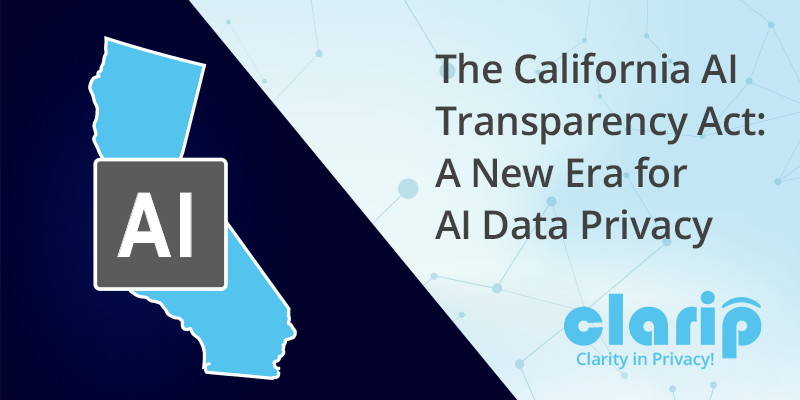California AI Transparency Act: A New Era for AI Data Privacy

On September 19, 2024, California Governor Gavin Newsom signed the California AI Transparency Act, a landmark regulation focused on ensuring transparency in using generative artificial intelligence (AI) systems. The law, which takes effect on January 1, 2026, is a crucial step forward in the ongoing effort to balance innovation with accountability in AI development.
Unlike previous legislation that focused primarily on general AI safety, the California AI Transparency Act emphasizes data privacy, mandating specific measures to ensure that consumers are aware when they are interacting with AI-generated content. This new law sets California apart as a leader in AI governance by introducing comprehensive watermarking and disclosure requirements.
Key Provisions of the California AI Transparency Act
The California AI Transparency Act applies to “covered providers”, which are defined as companies creating or developing generative AI systems with more than 1,000,000 monthly visitors or users in California. These providers must comply with several key requirements to ensure transparency about how AI-generated content is created and distributed:
- AI Detection Tools: Providers must offer free tools to detect AI-generated content, giving users the ability to verify whether text, images, or videos were created or altered using AI. These tools must also provide provenance data about the content’s creation, including the system used and its authenticity.
- Manifest and Latent Disclosures: The law mandates that AI-generated content include both manifest and latent disclosures. Manifest disclosures are clear and conspicuous markers identifying the content as AI-generated. Latent disclosures, embedded in the metadata, must include details such as the name and version of the AI system, the time and date of content creation, and a unique identifier.
- Contractual Safeguards: Covered providers are also required to enter into contracts with third-party licensees, ensuring that the generative AI systems they provide can maintain these disclosure capabilities. If licensees fail to comply, providers must terminate licenses within 96 hours.
Data Privacy Implications of AI-Generated Content
The California AI Transparency Act stands out for its focus on data privacy in AI applications. AI systems, particularly generative models, pose new challenges when it comes to protecting user privacy. These models are trained on vast amounts of data, some of which may include personal information or sensitive data points, raising concerns about data misuse, privacy breaches, and lack of user consent.
By enforcing transparency, California’s new law ensures that consumers are informed when they engage with AI-generated content, reducing the risk of deception and misuse. The law also highlights the need for user control over the personal data that AI systems might access, generate, or manipulate. Companies operating in California must take significant steps to protect user privacy and ensure compliance with stringent disclosure requirements.
In an era where AI-driven content is increasingly prevalent, this law sets an important precedent for balancing innovation with privacy protection. It empowers users to verify and understand the origins of AI-generated content, thereby fostering trust in the digital ecosystem.
How Clarip Can Help Enterprises Comply
As enterprises prepare for the January 1, 2026, enforcement of the California AI Transparency Act, they will need robust solutions to meet its complex requirements. This is where Clarip, a leading provider of data privacy and governance solutions, can play a pivotal role.
Clarip’s patented AI-powered scan orchestration technology is designed to help organizations automatically locate personal data across vast, decentralized systems. For companies managing generative AI systems, this technology can be instrumental in:
- AI Detection Tool Implementation: Clarip’s data discovery and governance tools can help businesses develop and deploy AI detection tools required by the Act. By automatically identifying AI-generated content across platforms, Clarip enables seamless compliance with manifest and latent disclosure obligations.
- Data Provenance and Reporting: With its powerful data scanning and reporting capabilities, Clarip provides enterprises with the tools they need to track and manage the provenance of AI-generated content. This ensures that the necessary metadata, including the AI system’s version, creation time, and identifier, is accurately embedded in the content as the law requires.
- License Compliance Management: Clarip can assist enterprises in ensuring compliance with the Act’s contractual obligations. By helping organizations monitor their third-party licensees and track the inclusion of disclosures in AI-generated content, Clarip enables timely responses and license revocation in the event of non-compliance.
- Data Privacy and Security: Clarip’s solutions offer a privacy-first approach that helps companies navigate the evolving regulatory landscape. By automating privacy compliance processes and enhancing visibility into AI-driven data flows, Clarip ensures that enterprises are well-equipped to protect user data while adhering to the Act’s transparency requirements.
Data privacy and AI governance are becoming inseparable. Clarip’s solutions provide a comprehensive approach to managing compliance challenges with the California AI Transparency Act. By leveraging Clarip’s cutting-edge technology, enterprises can ensure that their AI systems operate transparently, ethically, and fully comply with the law.
Ensuring you implement the right privacy tools and mechanisms keeps you compliant. It fosters a stronger relationship with your customers, who are increasingly concerned about how their data is being used and shared. Clarip takes enterprise privacy governance to the next level and helps organizations reduce risks, engage better, and gain customers’ trust!
To learn more about US privacy laws, check out the Clarip US Privacy Law Tracker
Clarip’s Data Privacy Governance Platform ensures compliance with all consumer privacy regulations, including the “Do Not Sell/Do Not Share My Personal Information” solution. Allow customers to submit, revoke and update granular consent with Clarip’s Universal Consent Management.
Clarip takes enterprise privacy governance to the next level and helps organizations reduce risks, engage better, and gain customers’ trust! Contact us at www.clarip.com or call Clarip at 1-888-252-5653 for a demo.
Email Now:
Mike Mango, VP of Sales
mmango@clarip.com
Related Articles:
Data Privacy and the Future of Digital Marketing
US Privacy Law Tracker
Understanding US Data Privacy Law Fines
Evolution of digital consent and preferences
What Is GPC (Global Privacy Control), And why does it matter?
















